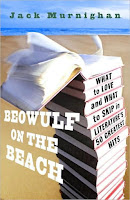 Beowulf on the Beach by Jack Murnighan - I read this book on the plane back from Nashville, and I found it enjoyable, even if it was a little uneven in places. Murnighan brings up some interesting points about the great books of western civilization, such as the parallelism found in the Bible. Furthermore, I like the argument that there are some passages in great books that need to be skipped. I remember getting into an argument with another English teacher who couldn't believe that my school didn't require students to read all of Walden. Looking back, I wish I had this book to use as my rebuttal.
Beowulf on the Beach by Jack Murnighan - I read this book on the plane back from Nashville, and I found it enjoyable, even if it was a little uneven in places. Murnighan brings up some interesting points about the great books of western civilization, such as the parallelism found in the Bible. Furthermore, I like the argument that there are some passages in great books that need to be skipped. I remember getting into an argument with another English teacher who couldn't believe that my school didn't require students to read all of Walden. Looking back, I wish I had this book to use as my rebuttal.Where the Girls Are by Susan J. Douglas - Okay, it is a bit of a stretch calling this "leisure reading" since I was planning on using this as part of my dissertation. While I didn't find anything that useful for my proposal or dissertation, Douglas's discussion and analysis of the portrayal of femininity in the media during the 1960s and 1970s was thought-provoking. Even when I didn't agree with her points, I had to acknowledge that she makes some convincing arguments.
The Year of Living Biblically by A.J. Jacobs - This is my favorite book (so far) this summer. While I enjoyed Jacobs's first book, The Know-It-All, my very complicated relationship with religion made me reluctant to read The Year of Living Biblically, in which Jacobs chronicles the year he spent trying to follow all of the rules prescribed by the Bible. Luckily, Jacobs undertakes this seemingly overwhelming and somewhat provocative task with candor and humor. His honesty and open-minded approach to the experiment make this book accessible, informative, and entertaining, even for a skeptical person like me.
 Rod Serling and The Twilight Zone by Douglas Brode and Carol Serling - The Twilight Zone (the original series, not the later incarnations) is a show that I almost always find entertaining and disturbing. This book looks at how Serling's views, foibles, and ideas helped shape and propel the various themes found in the show. Overall, the book was a good read, but it sometimes feels a little too reverent in its discussion of Serling, comparing his work with that of Frank Capra, William Shakespeare, and Edward R. Murrow. Although these comparisons are often justifiable, I got the impression that the authors were trying too hard to show Serling's genius and his considerable influence on television and American culture. In the end, perhaps letting Serling's work stand on its own would have allowed me to gain a better appreciation of it.
Rod Serling and The Twilight Zone by Douglas Brode and Carol Serling - The Twilight Zone (the original series, not the later incarnations) is a show that I almost always find entertaining and disturbing. This book looks at how Serling's views, foibles, and ideas helped shape and propel the various themes found in the show. Overall, the book was a good read, but it sometimes feels a little too reverent in its discussion of Serling, comparing his work with that of Frank Capra, William Shakespeare, and Edward R. Murrow. Although these comparisons are often justifiable, I got the impression that the authors were trying too hard to show Serling's genius and his considerable influence on television and American culture. In the end, perhaps letting Serling's work stand on its own would have allowed me to gain a better appreciation of it.How to Read Like a Writer by Francine Prose - I really wanted to like this book, and I tried to read it numerous times. However, this is it. I officially give up. While Prose makes some valid points, I just couldn't connect with the book. There are so many other books about reading that I find more interesting and just as (if not more) informative that I can't justify spending anymore time trying to read How to Read Like a Writer.







0 comments:
Post a Comment